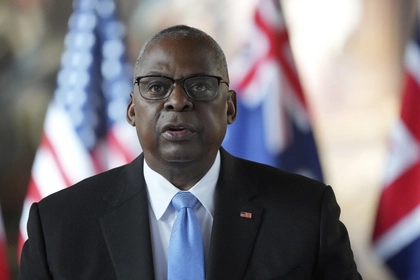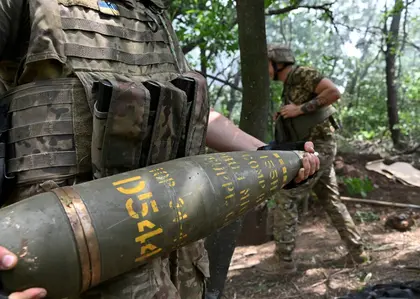The first emergency deliveries of artillery shells bought by EU nations to compensate for the impasse in US military support to Ukraine that has been stalled in Congress for more than two months may reach the front line “within weeks,” a senior official in Prague said.
Jan Jires, director general for defense policy at the Czech Ministry of Defense, told the Bloomberg news agency that a key group of European states has already agreed to ante-up most of the funding needed to support the $1.5 billion emergency Ukrainian assistance initiative put forward by his government in late February.
JOIN US ON TELEGRAM
Follow our coverage of the war on the @Kyivpost_official.
Canada, Denmark, and other countries not wishing to be identified have pledged funding, Jires said in March 1 comments. On Feb. 28 Belgium said it would donate $216 million, and Dutch Prime Minister Mark Rutte announced the Netherlands would provide $162 million on Mar. 2, upping the Hague’s previous pledges for artillery ammunition to reach $271 million for the year.
Czech Prime Minister Petr Pavel’s Feb. 24 called for European states to come together to purchase and deliver to Ukraine 500,000 155mm NATO-caliber artillery shells, and 200,000 122mm Soviet-caliber artillery shells. Germany’s Der Spiegel reported Berlin diplomats had met with Indian manufacturers to discuss the possible purchase of 155mm shells.
The highly reliable 155mm munition outperforms equivalent Russian ammunition used in Ukraine. Aside from NATO member states, the ammunition also is produced in quantity in South Africa, India, Turkey and South Korea. Berlin prefers that the orders for and the origin of ammunition to Ukraine not be made public, the Spiegel article said.

Pentagon Chief in Kyiv on Solidarity Visit
Jires’ comments largely confirmed the fast-moving European initiative to deliver artillery shells to Ukraine as quickly as possible has found supporters able to offer substantial funding, and that the critical shortages suffered by the Ukrainian military might be somewhat relieved in the near future.
Since Russia’s February 2022 invasion of Ukraine, the US has been responsible for approximately half of all international military aid to Ukraine including artillery shells. Its arms deliveries to Kyiv effectively stopped at the end of December.
The EU states promised in March 2023 to deliver one million artillery shells to Ukraine over twelve months, but have been slow to up production sufficiently to meet that target.
According to Ukrainian official military sources and frontline soldiers, the slow pace of international artillery shell deliveries during 2023 triggered severe shortages in November and December, and a near-famine ammunition situation by the start of 2024.
Official Ukrainian sources led by President Volodymyr Zelensky blamed critically low reserves of artillery ammunition for the December loss of the strategically important fortified Donbas region town Avdiivka, which the Ukrainian military had held against repeated Russian attacks since 2014.
The Ukrainian army’s general staff in Monday morning's situation report said the heaviest weight of ongoing Russian attacks, by tanks and infantry backed by intense artillery strikes, were hitting the northeastern Kupyansk sector and the eastern Avdiivka sectors. Ukrainian forces were holding, the official Kyiv military statement said.
The independent DeepState military information platform confirmed Ukrainian troops had been hit by Russian assaults over the past 24 hours but had managed to hold their ground at most locations, but had lost positions near the villages of Ivanivka and Novomyailivka, in the eastern Donetsk sector.
US funding for further deliveries of 155mm and other US-produced artillery ammunition has been stalled in Congress since late 2023, because of internal disputes in the Republican party and attempts to link foreign military aid legislation with that governing border and immigration issues.
The bill is currently caught in the House of Representatives. US House speaker Mike Johnson (R-LA) said at the end of February he would not bring the bill to the floor without major concessions by Democrats on immigration. Not all Republicans in the House support Johnson’s position. Although the bill is widely supported by Democrats in the House, some oppose it on grounds that the immigration elements are too harsh.
Washington media reported in early March that Democrats and the pro-Ukraine wing of House Republicans had sufficient votes to bring the bill to the floor and approve it, over the objections of Johnson and other representatives opposing the Ukraine aid bill in its present form.
According to the main US media outlets on Sunday, however, there was little likelihood that this forced floor vote maneuver, called a discharge petition, would happen, and that a new round of bipartisan negotiation would be necessary before a bill could be approved. The latest House plan to find bipartisan support would strip all humanitarian aid from the bill and leave only military assistance worth $66 billion in total to support Ukraine, Israel and Taiwan, CNN reported on Sunday.
Artillery ammunition is a major component of US military assistance to Ukraine and its arrival in quantity has repeatedly stopped major Russian offensives cold. This was particularly evident during failed Kremlin attempts to cross the Siveiersky Donets River in May 2022, and to capture the fortified city of Vuhledar in Feb. 2023.
Massed barrages by Ukrainian artillery firing 155mm shells crushed both assaults.
You can also highlight the text and press Ctrl + Enter






